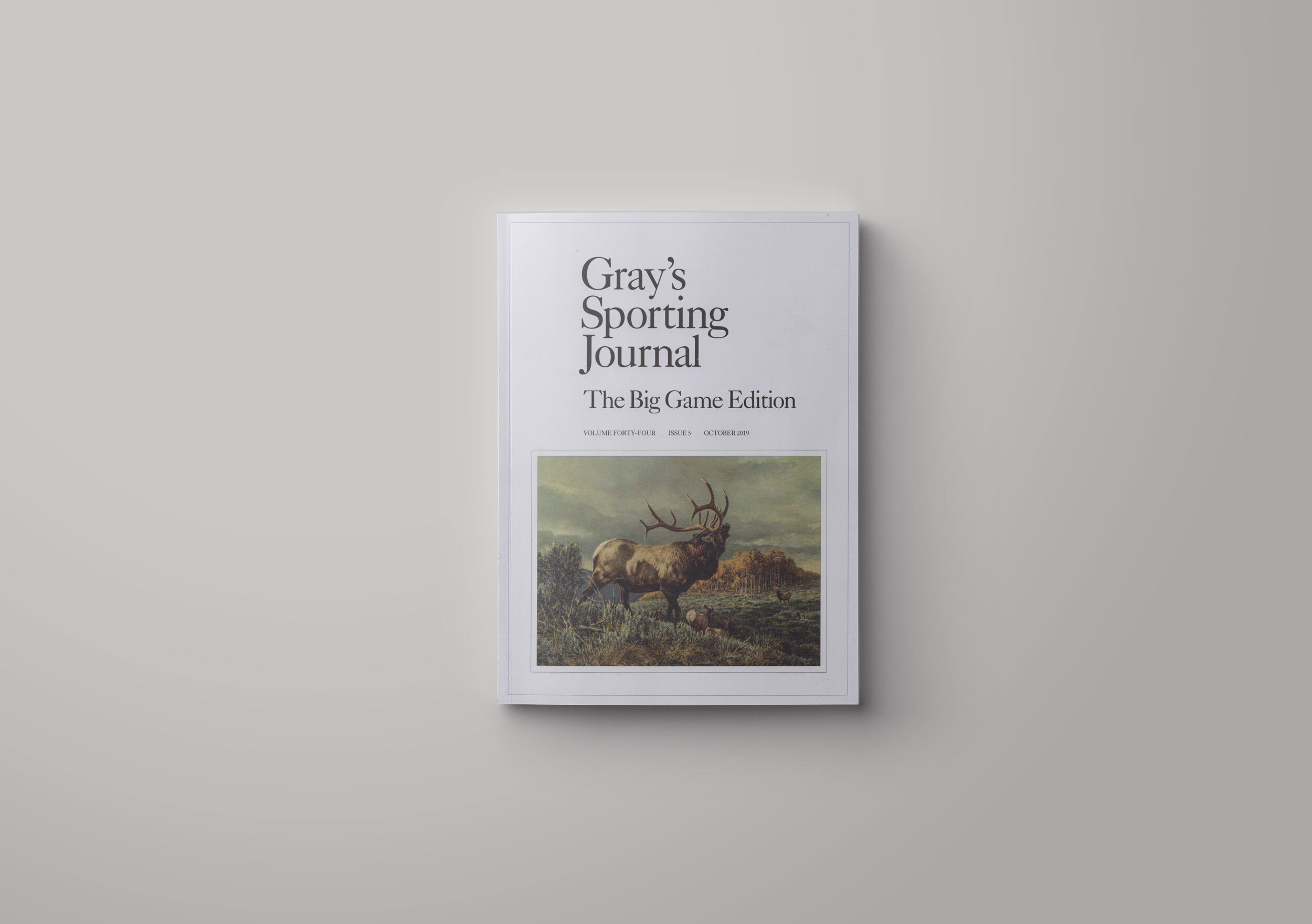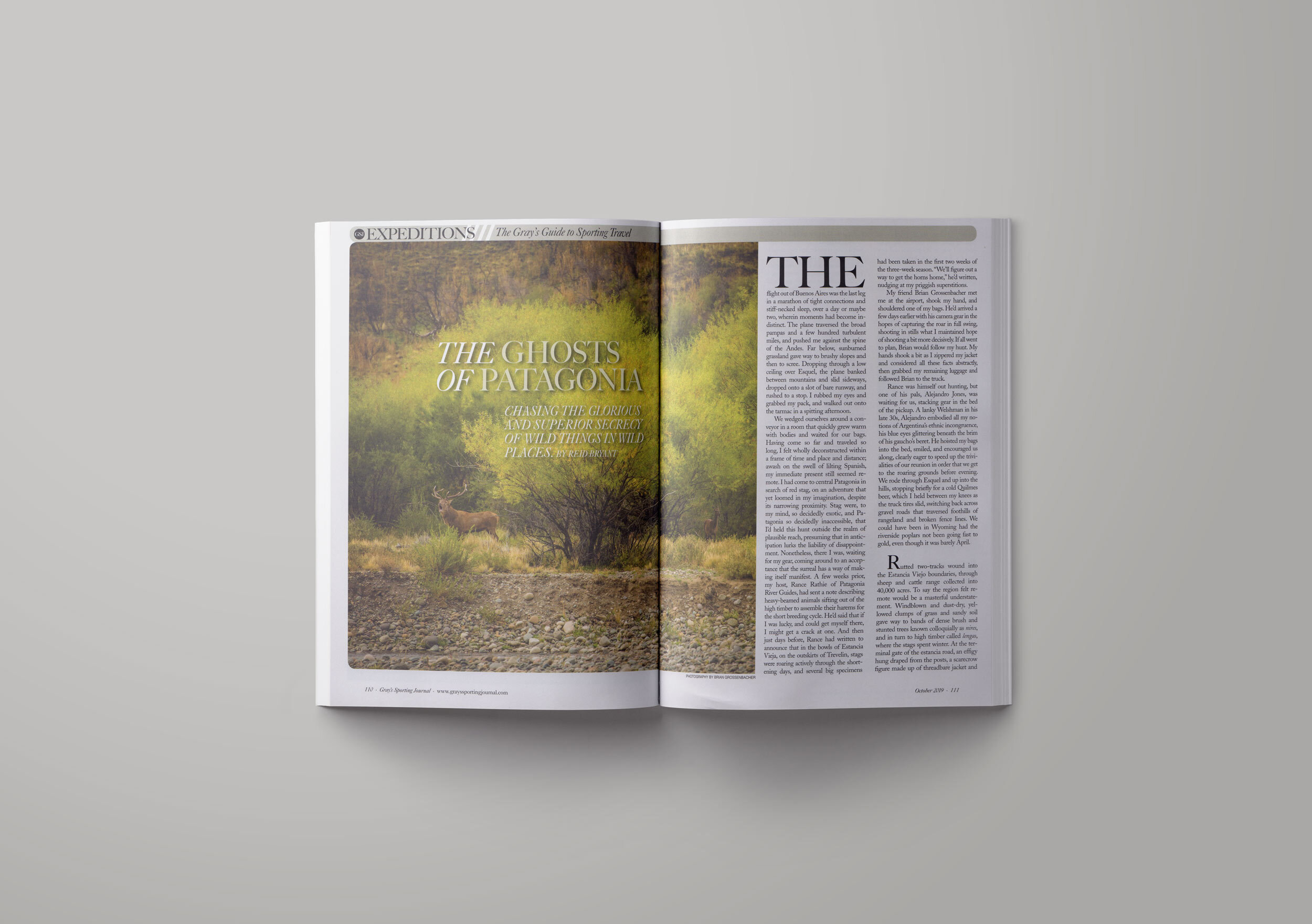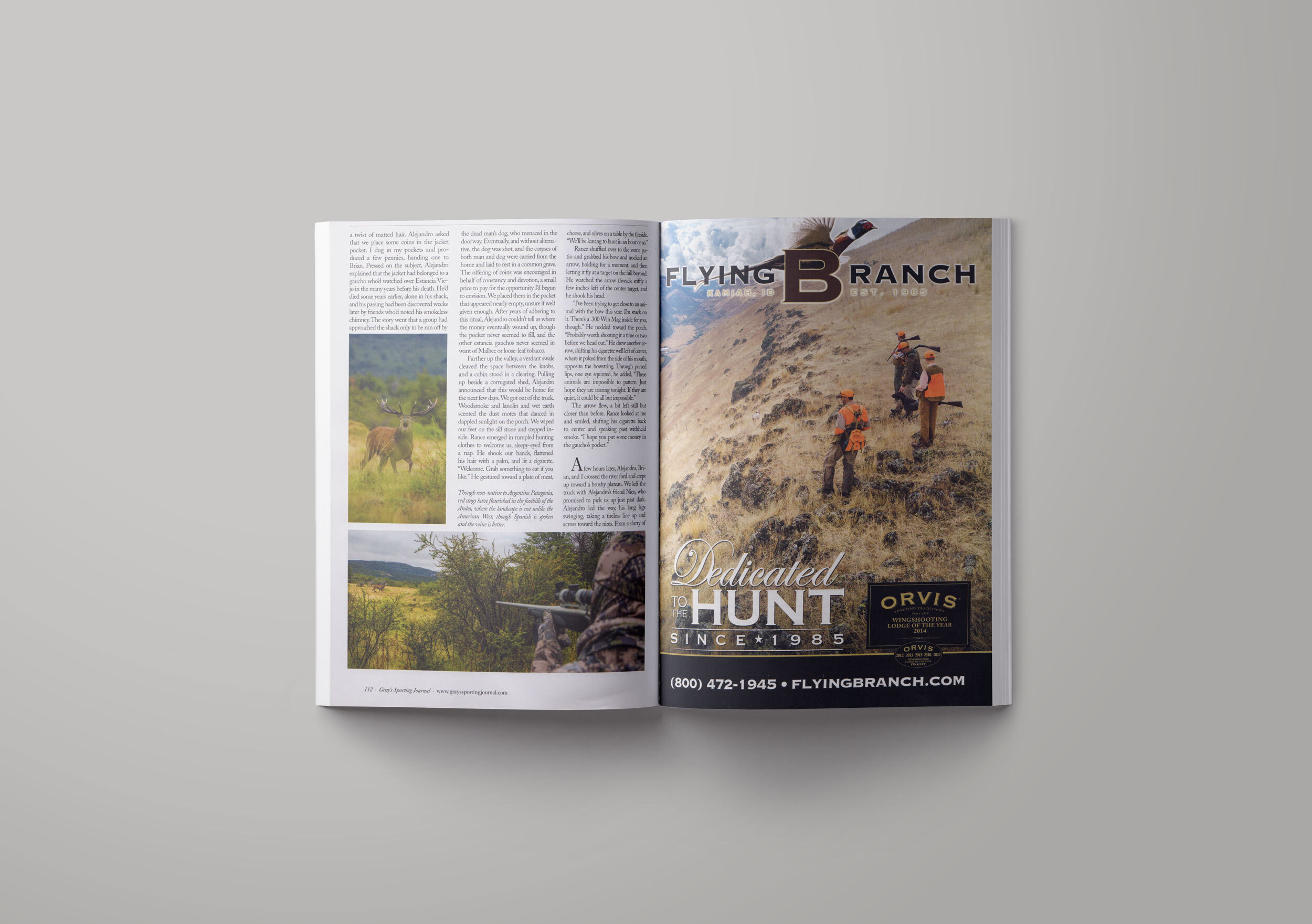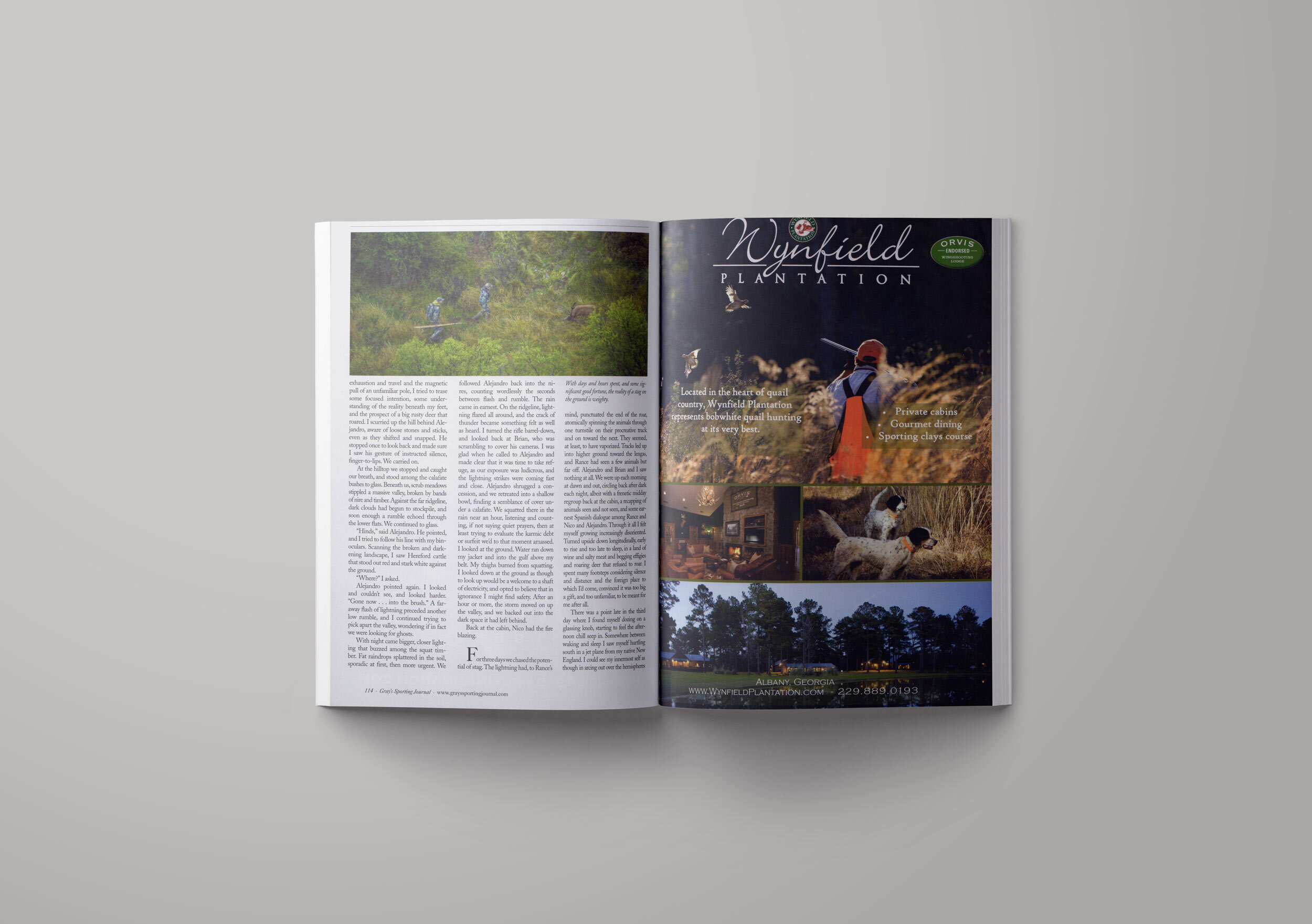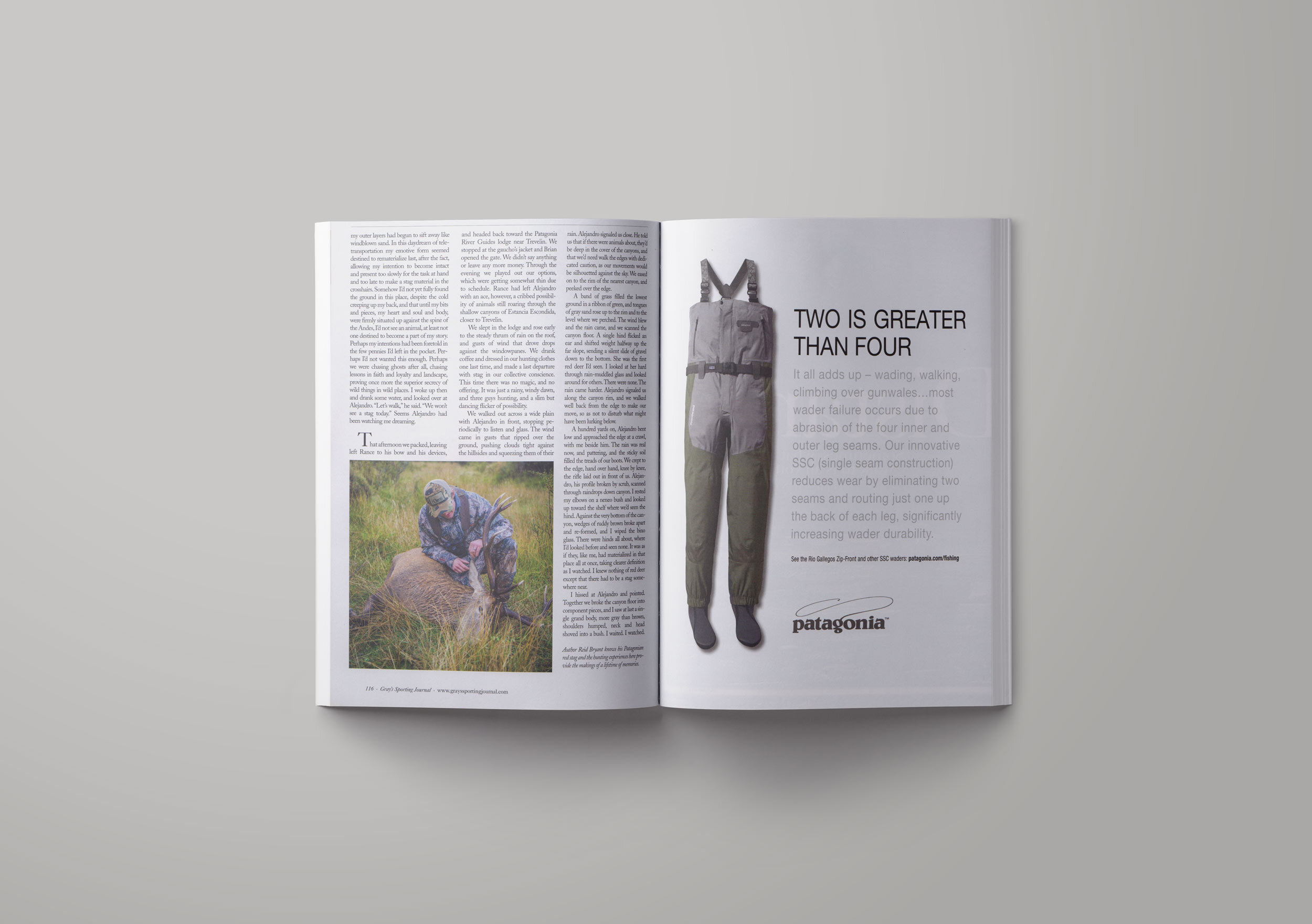The Ghosts of Patagonia
The flight out of Buenos Aires was the last leg in a marathon of tight connections and stiff-necked sleep, over a day, or maybe two, wherein moments had become indistinct. The plane traversed the broad pampas and a few hundred turbulent miles, and pushed me up against the spine of the Andes. Far below, sunburned grassland gave way to brushy slopes and then to scree. Dropping through a low ceiling over Esquel, the plane banked between mountains and slid sideways, dropped onto a slot of bare, flat ground, and rushed to a stop. I rubbed my eyes and grabbed my pack, and walked out onto the tarmac in a spitting afternoon.
We wedged ourselves around a conveyer in a room that quickly grew warm with bodies, and waited for our bags. Having come so far, and travelled so long, I felt wholly deconstructed within a frame of time and place and distance; awash on the swell of lilting Spanish my immediate present still seemed remote. I had come to central Patagonia in search of red stag, on an adventure that yet loomed in my imagination, despite its increasing proximity. Stag were, to my mind, so decidedly exotic, and Patagonia so decidedly inaccessible, that I’d held this hunt outside the realm of plausibile reach, presuming that in anticipation lurks the liability of disappointment. Nonetheless, there I was, in a room warm with bodies, waiting for my gear, coming around to an acceptance that the surreal has a way at times of making itself manifest. A few weeks prior, my host Rance Rathie of Patagonia River Guides had sent a note describing heavy-beamed animals sifting out of the high timber to assemble their harems for the short breeding cycle. He’d said that if I was lucky, and could get myself there, I might get a crack at one. And then just days before, Rance had written to announce that in the bowls of Estancia Vieja, on the outskirts of Trevelin, stags were roaring actively through the shortening days, and several big ones had been taken nearby in the first two weeks of the three-week season. “We’ll figure out a way to get the horns home,” he’d written, nudging at my priggish superstitions.
My friend Brian Grossenbacher met me at the airport, shook my hand and shouldered one of my bags. He’d arrived a few days earlier with his camera gear in the hopes of capturing the roar in full swing, shooting in stills what I maintained hope of shooting a bit more decisively. If all went to plan, Brian would follow my hunt. My hands shook a bit as I zippered my jacket and considered all of these facts abstractly, then grabbed my remaining luggage, and followed Brian out towards the truck.
Rance was himself out hunting, but one of his pals, Alejandro Jones, was waiting for us, stacking gear in the bed of the pickup. A lanky Welshman in his late thirties, Alejandro embodied all my notions of Argentina’s ethnic incongruence, his blue eyes glittering beneath the brim of his gaucho’s beret. He hoisted my bags into the bed, smiled, and encouraged us along, clearly eager to speed up the trivialities of our reunion in order that we get to the roaring grounds before evening. We rode through Esquel and up into the hills, stopping briefly for a cold Quilmes beer, which did little to hasten my acclimatization. I held it between my knees as the truck tires slid, switching back across gravel roads that traversed foothills of rangeland and broken fence lines. We could have been in Wyoming had the riverside poplars not been going fast to gold, even though it was barely April.
*
Rutted two-tracks wound into the Estancia Viejo boundaries, through sheep and cattle range collected into 40,000 acres. To say the region felt remote would be a masterful understatement. Windblown and dust-dry, yellowed clumps of grass and sandy soil gave way to bands of dense brush and stunted trees known colloquially as Nires, and in turn to high timber called Lengas, where the stags would winter. At the terminal gate of the estancia road, an effigy hung draped from the posts, a scarecrow figure made up of threadbare jacket and a twist of matted hair. Alejandro asked that we place some coins in the jacket pocket. I dug in my pockets and produced a few pennies, handing one to Brian. Pressed on the subject, Alejandro explained that the jacket had belonged to a gaucho who’d watched over Estancia Viejo in the many years before his death. He’d died some years earlier, alone in his shack, and his passing had been discovered weeks later by friends who’d noted his smokeless chimney. The story went that a group had approached the shack only to be run off by the dead man’s dog, who menaced in the doorway. Eventually, and without alternative, the dog was shot, and the corpses of both man and dog were carried from the home and laid to rest in a common grave. The offering of coins was encouraged on behalf of constancy and devotion, a small price to pay for the opportunity I’d begun to envision. We placed them in the pocket that appeared nearly empty, unsure if we’d given enough. After years of adhering to this ritual, Alejandro couldn’t tell us where the money would eventually wind up, though the pocket never seemed to fill, and the other estancia gauchos never seemed in want of Malbec or loose-leaf tobacco.
Further up the valley, a verdant swale cleaved the space between the knobs, and a cabin sat in a clearing. Pulling up beside a corrugated shed, Alejandro announced that this would be home for the next few days. We got out of the truck. Woodsmoke and lanolin and wet earth scented the dust motes which danced in dappled sunlight on the porch. We wiped our feet on the sill stone and stepped inside. Rance emerged to welcome us, sleepy-eyed from a nap. He was wearing his rumpled hunting clothes. He shook our hands, flattened his hair with a palm and lit a cigarette. “Welcome. Grab something to eat if you like. We’ll be leaving to hunt in an hour or so.” He gestured towards a plate of meat and cheese and olives on a table by the fireside.
Rance shuffled over to the stone patio and grabbed his bow and nocked an arrow, holding for a moment then letting it fly at a target on the hill beyond. He watched the arrow thwack stiffly a few inches left of the center bull, and he shook his head. “I’ve been trying to get close to an animal with the bow this year. I’m stuck on it. There’s a .300 Win Mag inside for you, though.” He nodded toward the porch. “Probably worth shooting it a time or two before we head out.” He drew another arrow, shifting his cigarette well left of center, where it poked from the side of his mouth, opposite the bowstring. Though pursed lips, one eye squinted, he added “these animals are impossible to pattern. Just hope they are roaring tonight. If they are quiet, it could be all but impossible.” The arrow flew, a bit left still but closer than before. Rance looked at me and smiled, shifting his cigarette back to center and speaking past withheld smoke. “I hope you put some money in the gaucho’s pocket.”
*
A few hours later, Alejandro, Brian and I crossed the river ford and crept up towards a brushy plateau. We left the truck with Alejandro’s friend Nico, who promised to look for our headlamps and pick us up just past dark. Alejandro led the way, his long legs swinging, taking a tireless line up and across towards the nires. From a slurry of exhaustion and travel and the magnetic pull of an unfamiliar pole I tried to tease some focused intention, some understanding of the reality beneath my feet, and the prospect of a big rusty deer that roared. I scurried up the hill behind Alejandro, aware of loose stones and sticks, even as they shifted and snapped. He stopped once to look back, and made sure I saw his gesture of instructed silence, finger-to-lips. We carried on.
At the hilltop we stopped and caught our breath, and stood among the califate bushes to glass. Beneath us, scrub meadows stippled a massive valley, broken by bands of nire and timber. Against the far ridgeline, dark clouds had begun to stockpile, and soon enough a rumble echoed through the lower laying flats. We continued to glass, to construct blocks of movement and rounded edges from the shapes of the valley floor.
“Hinds,” said Alejandro. He pointed, and I tried to follow his line with my binoculars. Scanning the broken and darkening landscape, I saw Hereford cattle that stood out red and stark white against the ground.
“Where?” I asked.
Alejandro pointed again. I looked and couldn’t see, and looked harder. “Gone now… into the brush.” A faraway flash of lightning preceded another low rumble, and I continued to pick apart the valley, wondering if in fact we were looking for ghosts.
With night came bigger, closer lighting that buzzed among the squat timber. Fat raindrops splattered in the soil, sporadic at first, then more urgent. We followed Alejandro back into the nires, counting wordlessly the seconds between flash and rumble. The rain came in earnest. On the ridgeline, lightning flared all around us, and the crack of thunder became something felt, not heard. I turned the rifle barrel-down, and looked back at Brian, who was scrambling to cover his cameras. I was glad when he called to Alejandro and made clear that it was time to take refuge, as our exposure was ludicrous, and the lightning strikes were coming fast and close. Alejandro shrugged a concession, and we retreated into a shallow bowl, finding a semblance of cover under a califate. We squatted there in the rain for near an hour, listening and counting, if not saying quiet prayers then at least trying to evaluate the karmic debt or surfeit we’d to that moment amassed. I looked at the ground. Water ran down my jacket and into the gulf above my belt. My thighs burned from squatting. I looked down at the ground as though to look up would be a welcome to a shaft of electricity, and opted to believe that in ignorance I might find safety. After an hour or more, the storm moved on up the valley, and we backed out into the dark space it had left behind.
Back at the cabin, Nico had the fire blazing.
*
For three days we chased the potential of stag, and cloven tracks impressed in soft sand. The lightning had, to Rance’s mind, punctuated the end of the roar, atomically spinning the animals through one turnstile on their procreative track and on towards the next. They seemed, at least, to have vaporized. Tracks led up into higher ground towards the lengas, and Rance had seen a few animals but far off. Alejandro and Brian and I saw nothing at all. We were up each morning at dawn and out, circling back after dark each night, albeit with a frenetic midday regroup back at the cabin, a recapping of animals seen and not seen, and some earnest Spanish dialog among Rance and Nico and Alejandro. Through it all I felt myself growing increasingly disoriented. Turned upside down longitudinally, early to rise and too late to sleep, in a land of wine and salty meat and begging effigies and roaring deer that refused to roar. I spent many footsteps considering silence and distance and the foreign place to which I’d come, convinced it was too big a gift, and too unfamiliar, to be meant for me after all.
There was a point late in the third day where I found myself dozing on a glassing knob, starting to feel the afternoon chill seep in. Somewhere between waking and sleep I saw myself hurtling south in a jet plane from my native New England. I saw myself, my innermost self, unable to keep up with my corporeal self, as though in arcing out over the hemispheres my outer layers had begun to sift away like windblown sand. In this daydream of teletransportation my emotive form seemed destined to rematerialize last, after the fact, allowing my intention to become intact and present too slowly for the task at hand, and too late to make a stag material in the crosshairs. Somehow I’d not yet fully found the ground in this place, despite the cold seeping up my back, and that until my bits and pieces, my heart and soul and body, were firmly situated up against the spine of the Andes, I’d not see an animal, at least not one destined to become a part of my story. Perhaps my intentions had been foretold in the few pennies I’d left in the pocket. Perhaps I’d not wanted this enough. Perhaps we were chasing ghosts after all, chasing lessons in faith and loyalty and landscape, proving once more the superior secrecy of wild things in wild places. I woke up then and drank some water, and looked over at Alejandro. “Let’s walk,” he said. “We won’t see a stag today.” Seems Alejandro had been watching me dreaming.
*
That afternoon we packed and left the cabin, leaving Rance to his bow and his devices, and heading back towards the Patagonia River Guides lodge near Trevelin. We stopped at the gaucho’s jacket and Brian got out and opened the gate, but we didn’t say anything, or leave any more money. Through the evening we played out our options, which were getting somewhat thin due to schedule. Rance had left Alejandro with an ace, however, a cribbed possibility of animals still roaring through the shallow canyons of Estancia Escondida, closer to Trevelin. We slept in the lodge and rose early to the steady thrum of rain on the roof, and gusts of wind that drove drops against the windowpanes. We drank coffee and dressed in our hunting clothes one last time, and made a last departure with stag in our collective conscience. This time there was no magic, and no offering. It was just a rainy, windy dawn, and three guys hunting, and a slim but dancing flicker of possibility.
We walked out across a wide plain with Alejandro in front, stopping periodically to listen and glass. The wind came in gusts that ripped over the ground, pushing clouds tight against the hillsides, and sqeezing them of their rain. Alejandro signaled us close. He told us that if there were animals about they’d be deep in the cover of the canyons, and that we’d need walk the edges with dedicated caution, as our movements would be silouhetted against the sky. We eased on to the rim of the nearest canyon, and peaked over the edge.
A band of grass filled the lowest ground in a ribbon of green, and tongues of gray sand rose up to the rim and the level from which we looked. The wind blew, and the rain came, and we scanned the canyon floor. A single hind flicked an ear and shifted weight halfway up the far slope, sending a silent slide of gravel down to the bottom. She was the first red deer I’d seen. I looked at her hard through raindrop glass, and looked around for others. There were none. The rain came harder. Alejandro signaled us along the canyon rim, and we walked well back from the edge to make our move, so as not to disturb what might have been lurking below.
A hundred yards on, Alejandro bent low and approached the edge at a crawl, with me beside him. The rain was real now, and pattering, and making the sticky soil fill the treads of our boot soles. We crept to the edge, hand over hand, knee by knee, the rifle laid out in front of us. Alejandro, his profile broken by scrub, scanned through raindrops down canyon. I rested my elbows on a neneo bush and looked up towards the shelf where we’d seen the hind. Against the very bottom of the canyon, wedges of ruddy brown broke apart and reformed, and I wiped the bino glass. There were hinds all about, where I’d looked before and seen none. It was as if they, like me, had materialized in that place all at once, taking clearer definition as I watched. I knew nothing of red deer except that there had to be a stag somewhere near.
I hissed at Alejandro and pointed. Together we broke the canyon floor into component pieces, and I saw at last a single grand body, more gray than brown, shoulders humped, neck and head shoved into a bush. I waited. I watched. The rain was steady, soaking through my jacket and pants, pimpling my skin and drenching the hair at my collar.
And then, there he was, his head thrust back to sniff, a sweep of antlers grazing his back. Silence. A few short steps to corral his hind, and he stopped to watch, to assimilate. I looked at Alejandro.
“He’s not huge, but he’s mature, and you won’t get another shot.”
I lifted the rifle to rest on the bush, and cycled the bolt slowly, quietly. I popped the covers and found the stag through the raindrops, and he still seemed impossibly far.
“176 meters, maybe a bit more,” said Alejandro, and I breathed, and flicked the safety.
The day before I’d spoken with Rance about this moment purely hypothetically, and let slip my tendency to rush and jerk and miss. “Just breathe…” he’d said. “Many things, most things, go better when you breathe. Just breathe and shoot and don’t miss.”
I breathed again, and nestled my left hand under the toe of the stock. The stag took a step and turned downhill, giving me a good broadside, head high, facing right. He stepped again, and in that moment I saw the potential of him slipping out of my story and into the brush, into the ephemera he’d come from, and into the haunted places of loss and regret. This became very clear to me, as did my focus on that left shoulder, and finger meat on a trigger, and breathing. So I stopped. And breathed. And was silent. And then I shot, and chambered a second round, and watched a sea of hinds break free from the places we’d been watching for indeterminate minutes, or hours, or days, seeing almost nothing at all.
The stag was nowhere.
I looked over at Alejandro, who shrugged behind his binos, but kept looking. I did the same. “I’m pretty sure I got a good hit on him, but I never saw him fall,” I said, but already the seeds of doubt were settling into fertile places of my conscience. Alejandro shook his head. He took his shooting sticks and bailed over the edge and straight down, riding a slide of gray mud and sand all the way to the canyon floor. I walked higher up-canyon on the rim, ready to shoot again, or at least gain a better angle into the brush where I’d last seen the stag. Working higher and harder, I dropped down and found a lower tongue, losing sight of the scene for the first time, pulling myself up to a lower ridge to see the place I’d marked, a place receding fast into that place of frozen memories behind closed eyes. I was soaked and sweaty and shaking and breathing hard, and I looked down to the ribbon of green to see Alejandro’s shooting sticks standing out stark white, almost as white as the polished ivory tips of the antlers that he held in his outstretched hands.
*
The animal lay with it’s tongue limp and lolling, eyes still bright but glassy. We rolled him onto his back and straddled him. Brian held a front leg that wobbled from a broken shoulder. Wet musk, steam and rain and mud mingled and rose, and I slipped the cavity open with a knife and the paunch bulged white with lacework fat. I worked up to the diaphragm and punctured it in a vacuous rush of blood and air, and my arms became soaked to the elbows. I severed the trachea and pulled the upper organs back, and handed Alejandro the knife. He delicately circumvented the anus and pulled it away clean, and rolled the mass of innards out onto the wet grass, where they settled in subtle peristaltic spasms, as though clinging to a life that still hung nearby, not yet having departed the canyon. A hind, confused, circled within 20 meters, then saw us and bounded out. I lifted the heart from the mass of guts, and saw it had been torn with a ragged groove, a half tunnel in the purple muscle about the depth and width of a 30 caliber bullet. I smiled a bit, and was grateful.
As Alejandro climbed out of the canyon for the truck, Brian shot pictures. I sat with my hands in the cavity, my fingers wet and warm with blood, and I realized, somehow without irony or pretence, that I’d killed a lovely animal in a faraway place, with intention and conviction and what humility I had in me, and I was sorely happy. In that moment, my outlines became distinct, and the feelings more crisp, more angular. The rain stopped then, and the sky broke open just enough for me to see a wedge of Andean rock, and scree slope, and an autumn coming fast to manifest in the early days of April.
First published in Gray’s Sporting Journal
